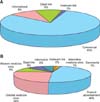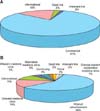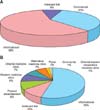This article has been
cited by other articles in ScienceCentral.
Abstract
Background
Patients with atopic dermatitis (AD) often resort to the internet for disease-related information. We believe that dermatologists be informed about the current accessibility of information to patients and the potential for misleading patients into making poor treatment decisions.
Objective
The study was carried out in order to determine the nature of AD-related information available on the internet in Korea, and to identify any changes since our last survey in 2005. The quality of information offered and the involvement of medical doctors in certain websites were also investigated.
Methods
Taking into account the current search engine market share in Korea, we gathered all search results obtained from the three major search engines using the keyword 'atopy', and investigated the nature of the information retrieved.
Results
The search results showed less commercial sites than our previous study in 2005. There is a dramatic increase in the number of public bodies offering information about AD. In addition, the quality of information available online has improved since our last survey.
Conclusion
The phenomenon of 'commercial overcrowding' seems to have stabilized. As AD becomes a more social phenomenon, patients are better informed than ever before. However, the information available on the internet still requires to be accompanied by consultation by dermatologists. We believe that self-regulation using a format such as the Health on the Net Foundation's code of conduct (HONcode) may improve the quality of online information accessible to patients with AD in Korea.
Keywords: Atopic dermatitis, HONcode, Internet
INTRODUCTION
The internet is an important resource for people seeking information on any topic including health. More than 70,000 websites offer health-related information and the number is increasing
1. A Korea Institute for Health and Social Affairs (KIHASA) survey found that 84.4% of respondents had experience of using the internet to search for health-related information
2. As the use of the internet among Koreans has increased substantially over the past decade, concerns over the quality of health information on the internet also continue to grow.
Quality evidence-based information is important for people living with atopic dermatitis (AD) to help them deal with their illness, especially since it is a chronic disease. AD is described as a chronic, recurrent disorder. The disease manifests as chronic pruritic eczematous lesions in different parts of the body. The need for information is pressing for patients looking to manage the illness since the symptoms of AD, which usually start in early infancy, are likely to persist into the teen years or beyond.
We performed an earlier study in 2005 that evaluated the information available to AD patients on the internet and showed that only a few websites provided high quality information. Patients often inquired about specific treatments, including long-term steroid use, a current mainstay of treatment in AD that has recently generated widespread concerns over its potential side effects. Therefore, it is important to evaluate website content to determine whether it is able to meet the needs of AD patients in terms of accurate and useful information.
The objective of this study was to gain a better understanding of the current online information resources available for people living with AD, and to evaluate the differences from our first study in 2005. Using the Health on the Net Foundation's code of conduct (HONcode), the present study assessed the quality of web resources providing information for patients with AD.
MATERIALS AND METHODS
We performed a keyword search on Naver (
www.naver.com), Daum (
www.daum.net), and Google (
www.google.com) with the keyword 'atopy', the term used by most Koreans for AD, in September 2014. The above three search engines were chosen because of their popularity. The identified websites were then classified according to type (
Table 1).
Next, 13 common websites emerging from the search results of at least two search engines were selected for quality analysis using a quality standard, the HONcode, the oldest and the most used ethical and trustworthy code for the evaluation of the quality of health information on the internet. The HONcode is composed of eight ethical principles, namely
authority,
complementarity,
privacy,
reference,
justifiability,
transparency,
sponsorship, and
advertising3.
RESULTS
Atopic dermatitis-related websites identified by the major search engines in Korea
A total of 1,218 websites were reviewed in September 2014. The number of websites identified by Naver, Daum, and Google, for the search term 'atopy' was 990, 131, and 97, respectively. Among 1,218 websites, removal of 73 duplicate websites left a total of 1,145 unique sites. Ninety websites were not accessible. When examining the number of websites classified under each of the characteristics evaluated, it was found out that only 14.7% (168/1,145 websites) of the websites provided information about AD. Among the latter 14.7%, 1% consisted of community websites, where atopic patients share information (
Fig. 1,
2,
3).
Website classification
A total of 76.7% (878/1,145) of the websites were commercial. Among these 878 websites, those that promote product advertisements constituted the largest proportion (504/878): 261 websites offered patients commercial products such as moisturizers, cosmetics, and soaps; 49 websites offered products dealing with sick building syndrome and problems associated with exposure to paint and building materials; 39 websites offered dietary supplements such as vitamin products, herbs, etc.; while 31 websites sold exclusively AD-related products (
Fig. 4).
The number of websites promoting clinics of western medicine and oriental medicine were 101 and 263, respectively. The clinical specialties of the 101 western medicine clinic websites were as follows: dermatology (61), pediatrics (34), family medicine (3), internal medicine (2), and urology (1) (
Fig. 5).
Quality analysis of the websites according to the HONcode principles
The analysis of the quality of the 13 websites offering AD related information, according to the HONcode eight principles is shown in
Table 2. None of the 13 websites satisfied all the eight principles. The website of Center for Disease Control under the Ministry of Health and Welfare (
http://atopy.cdc.go.kr) scored the highest by satisfying seven principles. Two websites satisfied six principles: Atopy Educational Center under the governance of the City of Seoul (
http://www.atopyinfocenter.co.kr/home/index.asp), and Allergy-Atopy-Asthma (
http://www.aaa.re.kr). Most websites (11 out of 13) satisfied the transparency criteria. However, websites satisfying authority, complementarity, and reference criteria were very few in number (
Table 2).
Involvement of medical doctors in the websites
As for the involvement of medical doctors in the websites, only one (
www.atopia.co.kr) out of the 13 websites offered online consultation by medical doctors. The website offered online consultation in three separate message boards, each of which were dedicated to a dermatologist, a pediatrician, and an oriental medicine specialist. Two other websites offered online consultations that were not led by medical doctors, but by the administrator or nurses. Korean AD Association (
http://www.atopy.re.kr) offers online consultation through its Q&A board, by the administrator, and City of Seoul (
http://www.atopyinfocenter.co.kr) offers online, offline, and telephone consultation by nurses.
DISCUSSION
The internet has the potential to facilitate patient's self-management by providing information on diseases and possible treatments. However, with its growing use, there is increasing concern about the quality of online health information.
In an earlier study looking at the AD information on the internet in Korea in 2005, the quality of many sites was suboptimal and most of the websites (97.0%) surveyed were commercial. Although the present study came to a similar conclusion, the portion of commercial websites has decreased (76.7%). However, including 'atopy' as the keyword when registering a website still seems to be recognized as an easy and safe sales tool by operators of commercial websites. Twenty-seven out of a total 1,145 search results were totally irrelevant with regards to AD. Websites selling soaps or baby products, almost without failure, included the keyword regardless of the product offered. Additionally, online shops dedicated entirely to providing AD-related products seem to be doing good business as well. Thirty-one such commercial websites were also included in the search results, compared with 12 in our previous study in 2005. However, the increased competition in AD-related industries eventually ended up shutting down some websites. Ninety out of total 1,145 search results were not accessible, most of which were commercial websites closed down by the web hosting company likely for not paying the hosting fees. This is an ongoing phenomenon, as we could no longer access 3 websites (out of 504 commercial websites) in mid-September, while all were accessible at the beginning of September. The quality of information has improved. In our previous study in 2005, there were many AD resources classified as oriental medicine websites, which provided low-quality information with no scientific evidence, but such websites were rare in the present study. This seems to be the result of the stronger social awareness about AD due to repeated media coverage. In this regard, we must also note that the central government of Korea and many regional governments are operating websites with information about AD, reflecting the higher demand from the public for such information. However, most websites contained only basic information about AD. Although there are some HONcode certified websites containing AD-related quality information such as Korea MediCare (
www.kormedi.com) and the Seoul Asan Medical Center (
www.amc.seoul.kr), it is not easy to find them: none of the three search engines identified 'Korea MediCare' and only Naver identified Seoul Asan Medical Center using the search term 'atopy'. Also, most websites did not adequately identify the sources of the information, which might be due to Korean online culture, where proper attribution for sources of information is not regarded as a requirement. Additional efforts are required to improve website quality by providing comprehensive information, identifying the date of publication, and clearly referencing the sources from which the information is obtained
4.
It is believed that patients are better able to cope with their disease if they are better informed. However, among the 13 websites providing AD-related information mentioned above, only one website offered online consultation by medical doctors. Participation of medical professionals in websites for health-related information is currently very low. It is imperative that medical doctors and website developers work together to provide useful and accurate information for people with AD.
Using the search term 'atopy' in three main search engines in Korea in September 2014, the results of the present study showed that the proportion of commercial websites has dropped and the quality of online information has improved since 2005. Increased competition in the industry and increased social awareness may be among the reasons for this change. However, the problem remains that many websites do not list either the source of information or the date of publication. Establishing or adopting a tool to evaluate websites such as the HONcode or DISCERN criteria, an instrument used to assess the quality of written consumer health information
5, could be an answer. In addition, medical doctors and healthcare providers need to be more involved in the decision-making of an AD patient's health by helping them distinguish between good and poor online resources and access to quality health information
6. Such participation will surely enhance the patient-doctor relationship.










 PDF
PDF ePub
ePub Citation
Citation Print
Print



 XML Download
XML Download